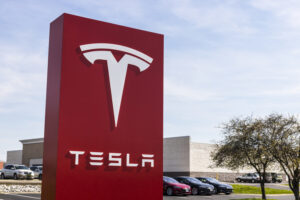
Tesla accused in lawsuit of monopolizing parts, repairs
By onBusiness Practices | Collision Repair | Legal
A group of Tesla owners have filed an antitrust class action lawsuit against the OEM, claiming they’ve been “forced to pay supracompetitive prices and suffer exorbitant wait times” to maintain and repair their vehicles.
The lawsuit, filed in California by Virginia M. Lambrix of San Francisco, claims Tesla’s monopolization of parts and repairs are financially burdening vehicle owners.
“Historically, consumers of traditional vehicles with internal combustion engines (‘ICE Vehicles’) have had multiple options for maintaining and repairing their motor vehicles after purchase—they could perform the work themselves, bring their vehicle to a dealership, or bring them to an independent repair shop,” the lawsuit says. “Moreover, when having that maintenance or repair, the consumer would have the choice of using original equipment manufacturer (‘OEM’) or aftermarket replacement parts.
“Tesla owners, by comparison, effectively have only one option: schedule service at Tesla (or within the limited network of Tesla-approved service centers), where their Tesla will be maintained or repaired using only Tesla OEM parts.”
The lawsuit claims the OEM is able to restrict its repairs and Tesla-compatible parts because of the power it has in the U.S. electric vehicle market. It says it does so by:
-
- “Designing its vehicle warranties and related policies to discourage Tesla owners from obtaining parts or services anywhere other than Tesla;
- “Designing its vehicles so that maintenance and repairs require access to diagnostic and telematic information accessible only through remote management tools exclusively accessed by Tesla;
- “and limiting access to its manuals, diagnostic tools, vehicle telematic data, and original equipment manufacturer (“OEM”) replacement parts.”
“As a result of this anticompetitive course of conduct, Tesla has prevented independent providers from entering the Tesla Repair Services market, prevented its OEM parts manufacturers from producing Tesla-Compatible Parts for anyone other than Tesla, and prevented market entry by non-OEM, Tesla-Compatible Parts manufacturers,” the lawsuit says. “This, in turn, has caused Tesla owners to suffer lengthy delays in repairing or maintaining their EVs, only to pay supracompetitive prices for those parts and repairs once they are finally provided.”
Tesla does have a number of certified collision centers, which it lists on its website. The OEM said that its approved collision centers “undergo rigorous training and are held to a high standard of excellence.”
The automaker has also made its repair manual available, for free, to everyone.
On its website, it warns drivers against buying non-OEM parts, saying it “does not accept liability for death, personal injury or damage that occurs if you use or install non-approved accessories or non-approved modifications.”
“Installing non-approved parts and accessories, or performing non-approved modifications, can affect the performance of Model S and the safety of its occupants,” it said. The same disclosures exist for other models. “Any damage caused by using or installing non-approved parts, or by performing non-approved modifications, is not covered by the warranty.”
The lawsuit against Tesla was filed as the “right to repair” movement gains traction in several states.
Last month, for example, Maine’s Secretary of State Shenna Bellows approved the Maine Right to Repair Coalition’s petition to have a referendum on November’s ballot.
As in Massachusetts, the legislation calls for the creation of a “standardized access platform” for data generated, collected, and transmitted by vehicles.
The latest lawsuit against Tesla contends vehicle owners have little choice when it comes to maintaining or repairing their cars.
“There are no viable substitutes for Tesla Repair Services, and they are not interchangeable with services designed for other vehicles. Therefore, while the Tesla Repair Services market is derivative of the EV market, it also comprises its own distinct product market,” the lawsuit says.
“Once consumers have purchased a Tesla EV, they are locked into repair and maintenance services specific to their Tesla vehicles. It is difficult, if not impossible, to accurately forecast how much repair and maintenance services will be required and what they will cost prior to purchasing an EV.”
It added: “As a result of this anticompetitive course of conduct, Tesla has prevented independent providers from entering the Tesla Repair Services market, prevented its OEM parts manufacturers from producing Tesla-Compatible Parts for anyone other than Tesla, and prevented market entry by non-OEM, Tesla-Compatible Parts manufacturers.
“This, in turn, has caused Tesla owners to suffer lengthy delays in repairing or maintaining their EVs, only to pay supracompetitive prices for those parts and repairs once they are finally provided.”
Tesla has not yet responded to the lawsuit.
Images
Featured image by jetcityimage/iStock
